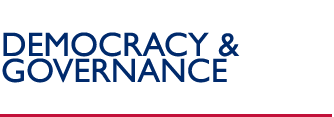Democracy and Governance in Benin
The Development Challenge: In a region with notable cases of failed or failing governments, since the early 1990s Benin has been a state that largely respects basic rights and freedoms and has conducted peaceful changes of power between opposing political camps. Presidential elections in 2006 are expected to result in the third peaceful turnover of the presidency since Benin's re-establishment as a democracy. After months of speculation in the press and protests from civil society organizations about a possible constitutional amendment to allow current President Mathieu Kerekou to run for office again, all debate on the issue appears to have ended. Benin was declared one of 16 countries eligible to apply for funds from the U.S. Government's (USG's) Millennium Challenge Account in FY 2004. As one of the few countries in Africa with a vibrant local media, a multitude of private media outlets, print and broadcast, have sprung up and function essentially free from government interference.
Over the past decade Benin has pushed for macroeconomic, fiscal and administrative reforms. Real gross domestic product (GDP) growth averaged about 5% annually from 1993 to 2003. Benin's ability to control inflation and the external current deficit were among the factors that enabled Benin to obtain debt relief amounting to $265 million in March 2003 under the Heavily Indebted Poor Countries Initiative. Benin has generally successfully met performance criteria and structural benchmarks, enabling it to draw on the resources of the International Monetary Fund through three successive arrangements since 1993.
Benin ranked 161 among 177 countries on the United Nations Development Program's 2004 Human Development Index. Per capita income for Benin's population of 6.7 million is $440. An estimated 33% lives below the national poverty line. Statistics on the status of health and education, although improving over the past decade, reflect a low level of human development. Life expectancy is 53 years. Mortality among children under five is 151 per 1,000. An estimated 23% of children under five are malnourished. Maternal mortality is estimated at 850 per 100,000 live births. The adult literacy rate, at nearly 40%, is well below the 63% rate for Sub-Saharan Africa. In Benin, adult literacy for women aged 15 and older is just over 25%, far below the rate for all of Sub-Saharan Africa.
Among significant development challenges facing Benin is an increasing perception that the Government is falling behind in its ability to govern effectively. Corruption and ineffective management are widely recognized as significant problems. Reports in the local press also point to a general perception that the robust economic growth mainly benefited politically connected elites. As the 2006 presidential elections approach, succession politics will consume greater attention and political energy. This is likely to curb the pace of government reforms to liberalize the cotton sector, reform customs administration, divest publicly-owned companies, and to establish a merit-based promotion system within the civil service.
The economy continues to be vulnerable due to reliance on agriculture and services which account, respectively, for 36% and 50% of GDP. In 2004 the Government announced that expected revenues had fallen far short of targets for the first half of the fiscal year. Shortfalls in revenues are closely tied to dependence on cotton and trade with Nigeria. Reforms in the cotton sector are not moving forward as planned. Trade with Nigeria is suffering due to its protectionist stance on third country re-exports coming from Benin. Policies necessary to promote economic diversification are moving forward, albeit slowly.
A final critical challenge to Benin's development prospects will be the ability to invest in the health and education of the Beninese people, especially women. At the current population growth rate of 2.5%, Benin's population is expected to reach 9.1 million by 2015. The Government is already hard pressed to meet the needs of its people for access to health care and education. Government expenditures as a proportion of GDP for health and education currently stand at 2.1% and 3.5% respectively. These are low compared to other low-income countries.
The United States and Benin have had an excellent relationship since Benin embraced democracy. The U.S. Government (USG) continues to assist Benin with the improvement of living standards that are key to the success of Benin's democratic government and economic liberalization, and are consistent with U.S. interests in reducing poverty and promoting growth. Benin recently agreed in principle to sign an Article 98 agreement with the USG. A delegation from the Department of State is scheduled to travel to Cotonou to negotiate final language of the agreement in early calendar year 2005.
Current trade between Benin and the United States is small, but interest in American products is growing. The United States is interested in promoting increased trade with Benin in order to expand U.S. trade with Benin's neighbors, particularly Nigeria, Niger, and Burkina Faso, all receiving large amounts of their own imports through the port of Cotonou. Such trade is facilitated by Benin's membership in the Economic Community of West Africa States (ECOWAS) and in the CFA franc monetary zone. The U.S. Government works to stimulate American investment in key sectors such as energy, telecommunications, and transportation. Benin is eligible for the African Growth and Opportunities Act but has not yet qualified for the Act's apparel provision, which would allow Benin to export apparel to the U.S. with few restrictions.
The USAID Program: USAID's programs in Benin include: 1) improving the quality of education with an emphasis on educating girls; 2) improving family health by preventing the spread of HIV/AIDS, encouraging the use of more effective modern family planning methods, and promoting health of mothers and children; and 3) improving government management and participation of community groups in governance issues that touch on education, health, and livelihoods.
(Excerpted from the 2006 Congressional Budget Justification for Benin)
Back to Top ^
|


